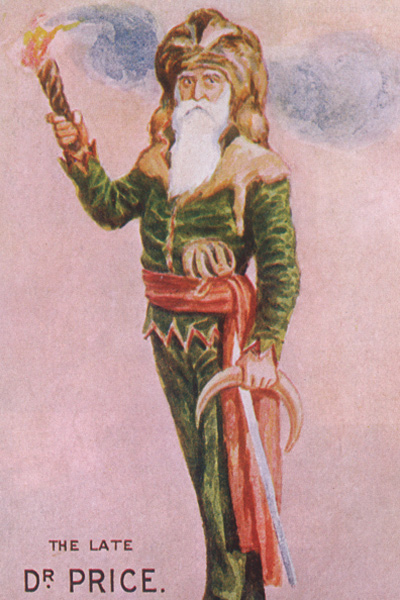A few months before he passed away, responding to a question about his doubts and beliefs, Jorge Luis Borges offered a rapt and potted account of the many cultural and religious registers in which human beings have for centuries been telling themselves stories about their own deaths. He then posed the following question: ‘Where does this tendency of man come from, to try to imagine and describe something that he cannot possibly know?’
Though Borges’s words do not feature in The Undiscovered Country, the force of his question can be felt on almost every page. For what Carl Watkins offers is an account of how ‘ordinary people’, from the Middle Ages to the aftermath of the Great War, have imagined, limned, mourned and memorialised the dead. This is not, Watkins swiftly asserts, a contribution to the history of ideas: there will be no tours of abstract theology, no treks through arcane philosophy. What there will be, as he somewhat bizarrely puts it, is ‘a modest bid to raise the dead’. This is a ‘book of many stories … set before the reader for contemplation’.
More bluntly, what we have here is something akin to a social history of death, a work of what we might term popular eschatology. Yet one wonders if such an approach can add anything new. Much of the early part of the book is comprised of a fairly standard discussion of the eschatological and soteriological ideas promulgated by the Catholic church in the Middle Ages, and the disruption of those ideas that was engendered by what the 16th-century clergyman Robert Parkyn called the ‘grevus matters’ of the English Reformation. Watkins’s sources might differ from those of the great intellectual and religious historians of the period, but the picture that emerges is, largely, a familiar one. (One of the problems with The Undiscovered Country is that much of the country has been discovered already.)
Accordingly, we see the enchanted world of medieval Catholicism — with its saints’ days and indulgences, its good works and post-mortem prayer, its Purgatory and psychostasis — give way to the relatively austere apparatus of Protestantism (which itself gives way, in time, to deism and atheism).
Watkins is not so lacking in nuance as to suggest that Protestant beliefs about death were not hugely marked by its Catholic heritage, or that Catholic beliefs did not persist in England for centuries after the Reformation, or that the English were on a high road to atheism and rationalism. This is not the story of the disenchantment of the world. Yet these parts of the book do not offer much that isn’t discussed by other historians in more detail. The Undiscovered Country is strongest and most original when it diverges from the established history of religious eschatology and enters a world that is marked by beliefs from another realm.
On occasion that world is a fatherless one, as we find in the story of the 19th-century physician (and Druid) William Price, who caused an uproar by choosing to cremate the body of his infant son, one Jesu Grist, in a barrel of petroleum on the highland of Cae’r-lan Fields in 1884. Price entertained no belief in the idea of life after death, and in the wake of his trial for such actions, legal opposition to cremation was abolished, and facilities for the provision of what Thomas Browne called a ‘fiery resolution’ spread across England for the first time.
Elsewhere, not long after Browne was writing, we hear how the 17th-century philosopher and clergyman Joseph Glanvill proposed ‘scientific’ evidence for the existence of spirits — supposedly anathema to reformed Christianity — in an attempt to banish the creeping spectres of deism and atheism, while in Cornwall in the 19th century, religious beliefs coexisted quite peaceably with belief in a land that was thick with ghosts: tin miners haunting the mineshafts and tunnels in which they had perished and beaches populated by the spirits of corpses washed in from the sea.
England around this time was a place in which the bodies of felons were thought to be possessed of magic powers (‘there was often a struggle to touch them to cure warts or cancers’), in which the apparatus from public executions was accorded similar status (a woman in 1752 travelled 15 miles in the hope of acquiring a noose), and in which, under the auspices of 19th-century Spiritualism (particularly popular in the Pennines), it was held that contact with the dead was not just possible, but ‘scientific’ and beneficial.
The Undiscovered Country abounds with details of this kind, conveyed by way of wonderful stories that, taken together, amount not just to a remarkable and engaging history of our beliefs about death, but to a deeply affecting chapter in the history of bereavement. Nowhere is this latter quality more evident than in the book’s concluding chapter, as Watkins leads us into the horror of the Great War, the event that did more than any other he treats to attenuate traditional rituals of death (no bodies, no funerals), and ‘to make a mockery of a loving God’. To many of those who had lost loved ones in the war, it was no longer the claims of religion that offered solace, but the cold and silent stone of the Grave of the Unknown Warrior.
The Undiscovered Country is a sombre book. It invites us to contemplate the generations of men and women who, faced with the knowledge that their lives had a terminus, exhibited the tendency identified by Borges and turned to thought, imagination, description and story. It is also able to achieve something serious, grown up, affirmative by reminding us that although death might be the price of our humanity, it is also the condition of it: that death, as Saul Bellow once phrased it, is ‘the dark backing that a mirror needs if we are to see anything’.






Comments